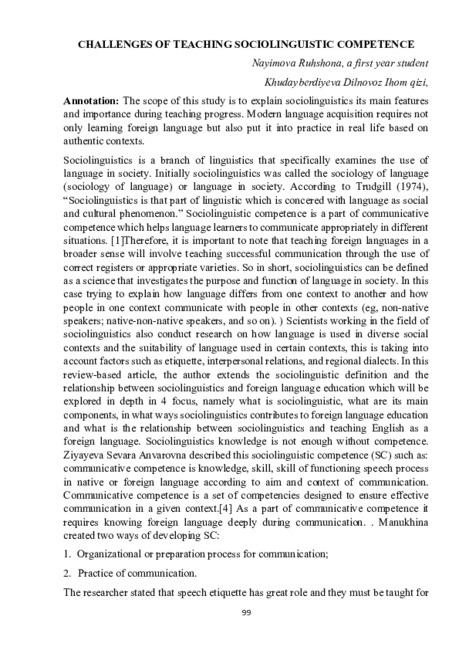
99
CHALLENGES OF TEACHING SOCIOLINGUISTIC COMPETENCE
Nayimova Ruhshona, a first year student
Khudayberdiyeva Dilnovoz Ihom qizi,
Annotation:
The scope of this study is to explain sociolinguistics its main features
and importance during teaching progress. Modern language acquisition requires not
only learning foreign language but also put it into practice in real life based on
authentic contexts.
Sociolinguistics is a branch of linguistics that specifically examines the use of
language in society. Initially sociolinguistics was called the sociology of language
(sociology of language) or language in society. According to Trudgill (1974),
“Sociolinguistics is that part of linguistic which is concered with language as social
and cultural phenomenon.” Sociolinguistic competence is a part of communicative
competence which helps language learners to communicate appropriately in different
situations. [1]Therefore, it is important to note that teaching foreign languages in a
broader sense will involve teaching successful communication through the use of
correct registers or appropriate varieties. So in short, sociolinguistics can be defined
as a science that investigates the purpose and function of language in society. In this
case trying to explain how language differs from one context to another and how
people in one context communicate with people in other contexts (eg, non-native
speakers; native-non-native speakers, and so on). ) Scientists working in the field of
sociolinguistics also conduct research on how language is used in diverse social
contexts and the suitability of language used in certain contexts, this is taking into
account factors such as etiquette, interpersonal relations, and regional dialects. In this
review-based article, the author extends the sociolinguistic definition and the
relationship between sociolinguistics and foreign language education which will be
explored in depth in 4 focus, namely what is sociolinguistic, what are its main
components, in what ways sociolinguistics contributes to foreign language education
and what is the relationship between sociolinguistics and teaching English as a
foreign language. Sociolinguistics knowledge is not enough without competence.
Ziyayeva Sevara Anvarovna described this sociolinguistic competence (SC) such as:
communicative competence is knowledge, skill, skill of functioning speech process
in native or foreign language according to aim and context of communication.
Communicative competence is a set of competencies designed to ensure effective
communication in a given context.[4] As a part of communicative competence it
requires knowing foreign language deeply during communication. . Manukhina
created two ways of developing SC:
1.
Organizational or preparation process for communication;
2.
Practice of communication.
The researcher stated that speech etiquette has great role and they must be taught for

100
learners. Manukhina gave three types of exercises for improving S.C:
1.
Revision and usage speech etiquette units belonging to certain specific group of
people.
2.
Correction and consolidation of popular speech etiquette, speech units, and also
mastering new speech units with certain thematic group
3.
Consolidation and revision speech etiquette which belonging to thematic
group.[3]
Based on given materials we can conclude that sociolinguistic competence is
inseparable part of learning process which help learners to communicate effectively,
impressive without any misunderstandings.
Reference:
1.
Jimmy Saputra1,a, Muhammad Rahmadeny1,b, Ichsan Jazzawi1,c The
Importance of Sociolinguistics in Foreign Language Education: A Review of
Selected Paper
2
Khudayberdiyeva D. “Developing sociolinguistic competence through teaching
reading B1 learners”
3
Manukhina Yu.V. On the question of the formation of sociolinguistic competence
in the processs of mastering speech etiquette formulas in English//Moscow State
Linguistic university,№2(741). 2016.-pp153-156.
2.
Мусурманова, О., et al. "Педагогик атамалар луғати: ўзбек, рус, инглиз
тилларида." Т.:“TURON_IQBOL (2019).
3.
Палуанова,
Х.
Д.
"Экологик
терминларнинг
деривацион
хусусиятлари." Т.: Фан ва технология 152 (2016).






